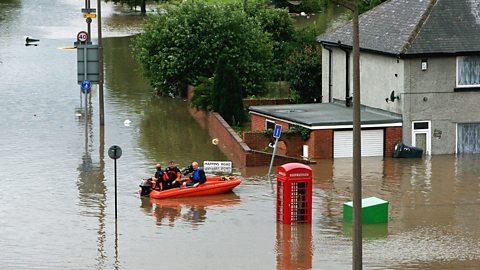Flooding
A river floods when the water normally flowing in the channel overflows its banks and spreads out onto the surrounding land. This causes major problems for people living close to the river.
Why do rivers flood?

A variety of factors can increase the likelihood of flooding.
Physical causes of flooding:
- heavy rainfall
- long periods of rain
- snowmelt
- steep slopes
- impermeableA substance which fluids are unable to pass through. rock (doesn't allow water through)
- very wet, saturated soils
- compactedWhen something is closely packed together. This could be used to describe a settlement or a soil that has been squashed by heavy machinery. or dry soil
Human factors increasing flood risk:
- urbanisationA growth in the urban population, usually resulting in the extension of towns or cities., because towns and cities have more impermeable surfaces
- deforestationThe cutting down of trees and forests to allow a different land use., because removing trees reduces the amount of water interceptTo interrupt the movement of something, eg water is intercepted by the leaves of trees when it rains. and increases run-offWhen rainwater flows over the surface of the land. This happens when the soil is too wet to absorb any more moisture.